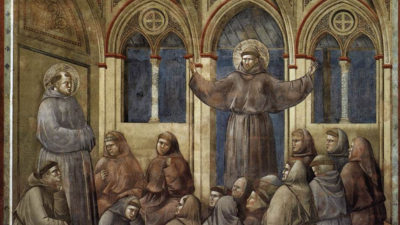Charism and Vocation
St. Francis of Assisi
Francis possessed a personal charism, a manner in which to live out his journey of faith. Was it the charism that would be the vocation of the Order? Was something different needed?

In the early summer of 1219, Francis left Assisi and traveled to Egypt, meeting with the Sultan of Egypt, Al-Malik al-Kamil. According to the Franciscan chronicler Jordan of Giano, informed by an eyewitness, a prophetess living in the Holy Land who was known as “the Tongue-that-Proclaims-the-Truth” declared to the friars: “Come back, come back, for the order is troubled by the absence of Brother Francis; it is divided and in the process of destroying itself.” Thus in May of 1220, the Poor Man of Assisi returned to Italy, where problems had been multiplying in his absence. In a prior article we mentioned some of the problems that had arisen, which Francis addressed. He then considered the future of the Franciscan movement. In September, 1220, he formally resigned his role as minister of the brothers.
The problems that Francis addressed were only indications of deeper growing pains within the community of brothers as they individually and collectively faced a real uncertainty over the very meaning of their vocations. Were they called to live lives of destitution to witness to the providence of God in the world? Were they called to commit their lives in charitable activities at the service of the sick, poor, and marginalized? Were they called to live monastically or as hermits, far from people and the world? As the feudal age collapsed and people moved to the cities in ever-increasing numbers, were they called to dedicate themselves to pastoral and sacramental activities while seeking to make up for the insufficiencies of the ill-prepared secular clergy? Were they called to mount popular crusades and missions with compelling oratory to move the hearts of people to penance?
While Francis was present with them in the years before 1219, the newness and charismatic dynamism of Francis was enough to keep the small group of brothers open to the unfolding vision that God was giving Francis. They took on no special tasks or roles, rather they committed to a certain way of living the Gospel of Jesus Christ. But as seen in the vocational questions above, the world and the Church had true needs, and the Pope especially saw in Francis and his brothers a ready reserve of workers for the vineyards of the Lord.
The spreading notoriety and good reputation of the friars began to attract a much different “demographic” of men willing to follow the Franciscan way: most notably, educated and at an ever-increasing rate, men already ordained as priests. Where lay brothers had been by the majority, the years 1210-1220 was perhaps the start of the “clericalization” of the friars. Very shortly, the friars needed to possess breviaries in order for the priests to pray the Divine Office daily. Before the age of Guttenberg, this involved considerable costs, leading to a place to store the books, keep them secure, and enjoining a degree of permanence about the life. This is famously seen in the correspondence between Anthony of Padua and Francis. The former had written to Francis for permission to teach theology (requiring books and more). Francis writes back giving his approval, but cautions that whatever Anthony does, that it does not extinguish the spirit of prayer. Francis understood the pitfalls of specialized vocations and ministries and was always cautious about any movement of the brothers in that direction. And yet this was the very thing that Pope Honorius was asking of the friars.
At the end of September 1220, he announced his intention to abandon the leadership of the order. To justify this unexpected decision, which astonished and disheartened the friars, he pointed to the state of his health. He had indeed come back sick from the East, where he had contracted trachoma, which would eventually make him virtually blind, and malaria, which racked him with violent pains of the spleen and liver. But the real reason for his unexpected withdrawal was probably his desire to avoid putting himself into conflict with the papacy or with those friars who were calling for a more precise definition of the mission of the order.
This rush of events and measures in the year and a half after Francis’ return to Italy reveal serious problems within the fraternity which the successes of the previous years had masked but which now emerged. The randomness which had reigned in his absence demonstrated the excessive dependency on Francis by his brothers, while the misplaced initiatives taken by some of his companions raised the question of just how the Friars Minor were going to play a role in Church and society. The very growth and extension throughout Christianity of the fraternity of friars made inevitable a process of institutionalization for which Francis was not prepared, even if he was not contesting its necessity. Evidently, Francis felt overwhelmed by the expansion of a religious movement which he had not foreseen, even though he had joyfully welcomed its birth and development. According to the Legend of the Three Companions, Francis saw in a dream a little black hen with countless chicks who were ceaselessly chirping for her to protect them but was having trouble gathering under her wings. And Francis said to himself: “I am this hen with my small stature and my dark color. . . . The chicks are my numerous and virtuous brothers that my poor forces are not able to shelter from calumnies and persecutions. I will thus go and entrust them to the Holy Roman Church. She has the power to chastise our enemies and to also guarantee to the children of God full freedom to allow for a much greater number to be saved.”